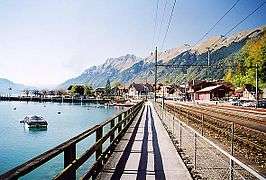Brienz railway station
Brienz | |
|---|---|
|
Brünig line trains in the station | |
| Location |
Hauptstrasse Brienz, Bern Switzerland |
| Coordinates | 46°45′18″N 8°02′18″E / 46.754928°N 8.038457°ECoordinates: 46°45′18″N 8°02′18″E / 46.754928°N 8.038457°E |
| Elevation | 566 m (1,857 ft) |
| Operated by |
Zentralbahn Brienz–Rothorn rack railway |
| Line(s) |
Brünig line (Zentralbahn) Brienz–Rothorn rack railway |
| Connections |
|
| Location | |
 Brienz Location within Switzerland | |
Brienz is a railway station in the village of Brienz in the Swiss canton of Bern. Brienz is a stop on the Brünig line, owned by the Zentralbahn, that operates between Interlaken and Lucerne. It is also the lower terminus of the Brienz–Rothorn rack railway (BRB) that climbs to the summit of the Brienzer Rothorn mountain.[1][2]
The station is served by passenger trains of both operators, and also provides an interchange with the local bus network provided by PostBus Switzerland. Shipping services operated by the BLS AG on Lake Brienz call at a quay adjacent to the station, linking to various lakeside places between Brienz and Interlaken. Amongst other destinations, buses link to the Ballenberg open-air museum, whilst boats link to the lower station of the Giessbachbahn funicular, which gives access to the Giessbach Falls.[3][4]
The station was opened in 1888 by the Jura–Bern–Lucerne Railway, as the western terminus of the Brünig line, with journeys to and from Interlaken requiring passengers and goods to transfer between trains and boats on Lake Brienz. The Brienz–Rothorn line terminus opened in 1892. Brienz remained the terminus of the Brünig line until 1916, when the line was extended along the north shore of Lake Brienz to Interlaken Ost, thus eliminating the need for transfer. Brünig line trains were hauled by steam locomotives until the early 1940s, when the line was electrified. Ownership of the Brünig line section of the station was transferred to the Swiss Federal Railway in 1903, and to the Zentralbahn in 2004.[5][6]
The Brünig line platforms of the station lie alongside the lake, and comprise two tracks with two flanking platforms. On the northern and inland side, the station building is situated between the platforms and the main road along the north shore of the lake. The terminus of the Brienz–Rothorn rack railway lies on the opposite side of this road, and the two railways and are not physically connected. The bus terminus is located to the west of the station building, between the Brünig line platforms and the main road, whilst the ferry pier is immediately to the south-east of the station, accessed by a level crossing.[1]
The following rail services currently serve Brienz:[7][8]
| Operator | Train Type | Route | Typical Frequency | Notes |
|---|---|---|---|---|
| Zentralbahn | InterRegio | Interlaken Ost - Brienz - Meiringen - Brünig-Hasliberg - Lungern - Kaiserstuhl OW - Giswil - Sarnen - Alpnach Dorf - Hergiswil - Lucerne | 1 per hour | |
| Zentralbahn | Regio | Interlaken Ost - Ringgenberg - Niederried - Oberried am Brienzersee - Ebligen - Brienz West - Brienz - Brienzwiler - Meiringen | 1 per hour | |
| BRB | Brienz - Planalp - Rothorn Kulm | 9 per day in summer only | Mostly steam trains |
Gallery
 The station in 1888, when it was a terminus.
The station in 1888, when it was a terminus.- The station building seen from the ferry pier.
- A Brienz–Rothorn rack railway train in the BRB platforms.
 BLS passenger ship Jungfrau at the ferry pier.
BLS passenger ship Jungfrau at the ferry pier. From left to right: ferry pier, Brünig line platforms, BRB terminus.
From left to right: ferry pier, Brünig line platforms, BRB terminus.
References
| Wikimedia Commons has media related to Brienz railway station. |
- 1 2 map.geo.admin.ch (Map). Swiss Confederation. Retrieved 2013-01-07.
- ↑ Eisenbahnatlas Schweiz. Verlag Schweers + Wall GmbH. 2012. p. 33. ISBN 978-3-89494-130-7.
- ↑ "Interlaken–Brienz (Brienzersee)" (PDF). Bundesamt für Verkehr. Retrieved 2013-01-08.
- ↑ "Brienz–Ballenberg–Brienzwiler–Brünig–HaslibergReuti (Hasliberg-Linie)" (PDF). Bundesamt für Verkehr. Retrieved 2013-01-08.
- ↑ "Die Geschichte der Zentralbahn" (in German). Zentralbahn. Archived from the original on 2013-07-23. Retrieved 2016-08-18.
- ↑ "Technical details of the Brienz Rothorn Bahn". Brienz Rothorn Bahn AG. Retrieved 2016-08-18.
- ↑ "Luzern–Brünig–Interlaken" (PDF). Bundesamt für Verkehr. Retrieved 2013-01-07.
- ↑ "Brienz–Rothorn" (PDF). Bundesamt für Verkehr. Retrieved 2013-01-07.